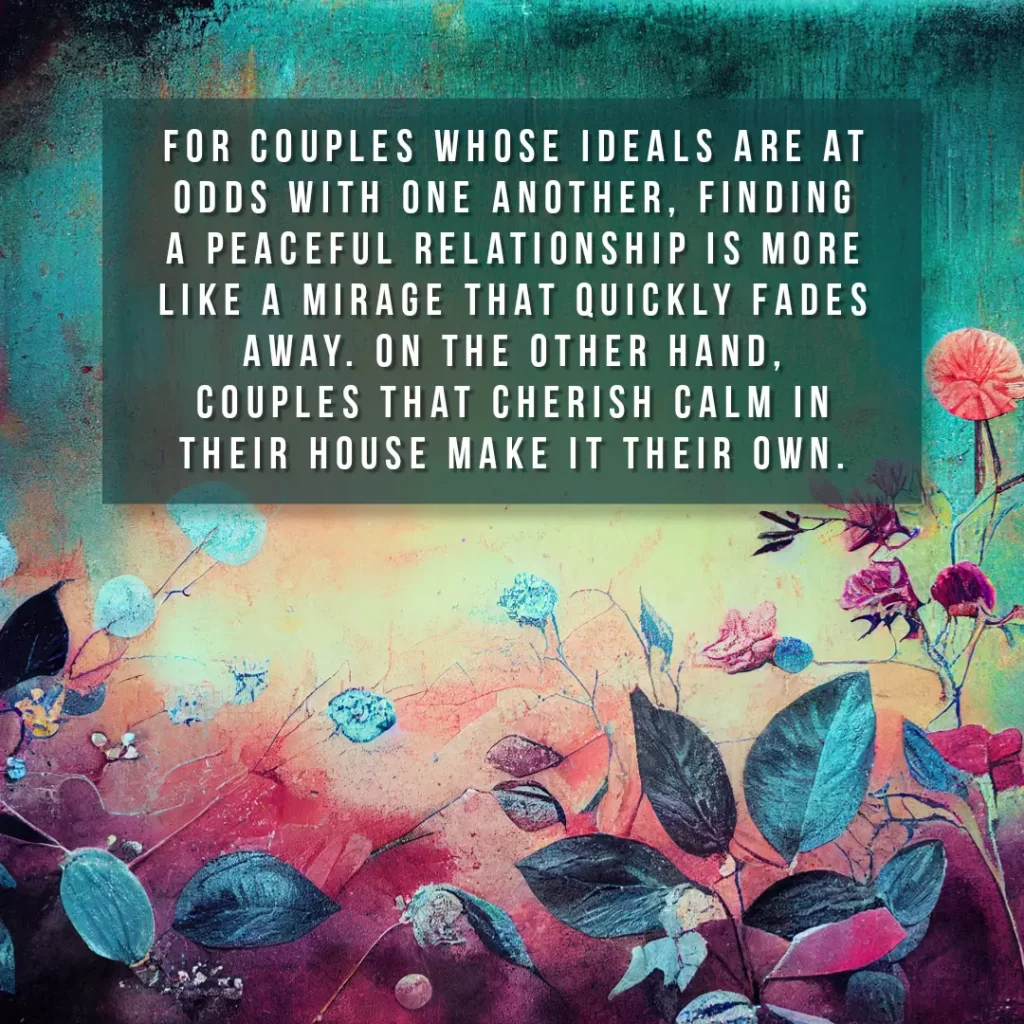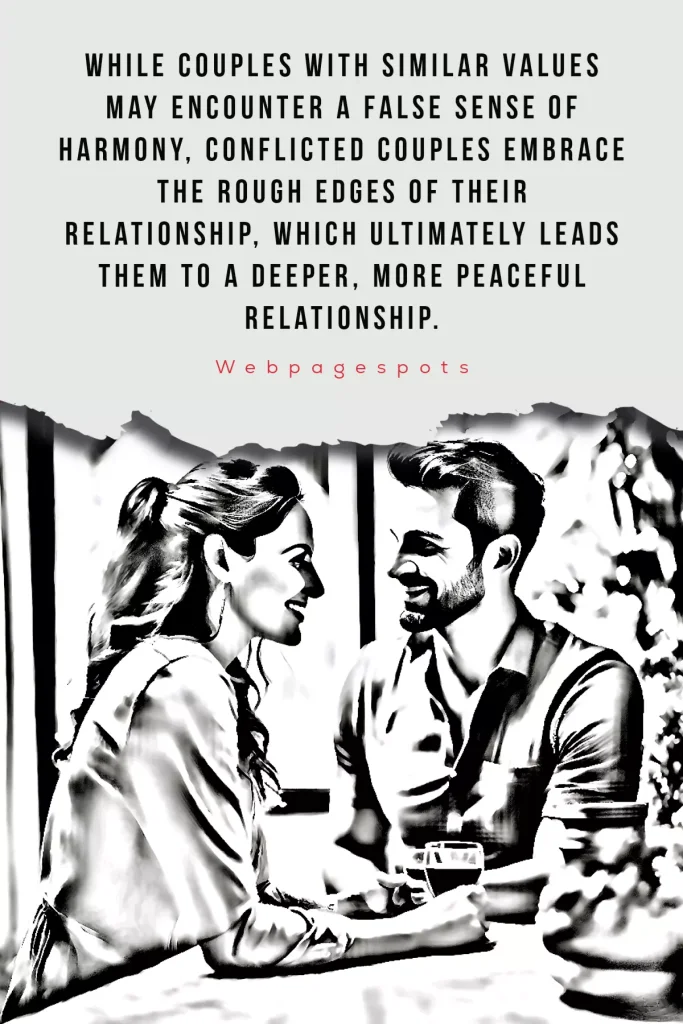Are conflicted couples more peaceful than those with similar values?
This blog post may contain affiliate links. If we find a product or service to be useful, we encourage you to visit the website via that link. If you make a purchase through our referral link, we may receive a commission. Rest assured, you will not be charged any additional fees. By using these links, you can support us while making your purchase. For more information visit here.
In the sphere of relationships, conflicts are an inevitable part of human dynamics. Hence, an intriguing question arises: are couples who experience frequent conflicts actually more peaceful than those who appear to have similar values?
This article seeks to delve into the question and unravel the complexities surrounding couples in conflict and relationships based on shared values.
Exploring the Dynamics of Conflicted Couples: Definition and Origin of Conflict:
Conflicts within a relationship occur when two or more individuals hold differing opinions, desires, or expectations. Differences can surface in different forms, such as conflicting views on making decisions, divergent lifestyles, individual boundaries, or even external factors like career paths.
The causes behind these conflicts often result from contrasting personalities or unique life experiences each individual brings into the relationship.
Although many people think that couples in constant conflict have inherently unstable relationships, it’s crucial for them to realize that conflict doesn’t have to be inherently harmful.
Instead, healthy disagreements can foster growth and strengthen relationships if handled constructively.
It is crucial to distinguish between healthy conflict resolution strategies and destructive patterns characterized by hostility or manipulation.
Similar Values in Relationships:
Alternatively, some couples find solace in shared values as a foundation for their relationship rather than in constant conflicts.
Such similarities may include common moral compasses and ethical principles regarding honesty, loyalty, and empathy towards others’ feelings—shared opinions on important matters like politics, social issues, or even religious beliefs play significant roles too.
They commonly believe that having shared values leads to smoother communication channels while navigating day-to-day challenges within the relationship.
Sharing aligned ideologies promotes a better empathetic understanding of one another’s needs. It creates a sense of unity, and positive reinforcement further strengthens their bond against outside forces seeking disarray.
Fewer clashes in daily interactions can suggest smoother communication and easier relationships.
How do similar values contribute to a peaceful relationship?
Couples with shared values enjoy a myriad of benefits that contribute to greater peace within their bond.
First, a foundation of similar values often creates a stronger sense of trust and understanding between partners, leading to more aligned actions and decisions.
Second, shared values facilitate effective communication by providing a common framework for expressing emotions, thoughts, and concerns.
Third, when both individuals hold parallel beliefs about concepts like compromise or forgiveness, it becomes easier to navigate disagreements constructively while preserving the peace within the relationship.
As couples with shared values are more likely to have compatible goals and visions for the future, they can collaboratively work towards these objectives without constant friction or internal conflict.
This alignment provides them with a solid base on which they can build mutual support networks that reinforce their peaceful coexistence even further.
To sum up:
While differences may arise in relationships, it is a mistake to assume that couples who frequently engage in disputes are inherently less peaceful than those who have similar values.
Healthy conflict resolution strategies play an integral role in personal growth and bonding within relationships.
Alternatively, couples who share common principles reap abundant rewards, leading to greater peace through a solid basis of trust, stability, and shared visions. Creativity thrives within constructive conversations, where differing perspectives merge under ethical umbrellas.
Such a scenario enables the blending of distinct experiences and ideologies, leading to extraordinary compromises.
In conclusion, effectively managing conflict enables couples to foster harmonious relationships and spur creativity. It is even in the face of differing perspectives!

Conflicted Couples vs. Similar Value Couples: 9 Differences to Consider
In the tangled web of human relationships, we often believe that couples who share similar values will naturally have a peaceful bond. Yet, an interesting question arises: are those couples who constantly face conflicts truly more peaceful than their counterparts with shared values?
This section delves into this intriguing topic by examining nine key differences between conflicted couples and those with similar values.
1. Communication Styles
Conflicted couples often navigate intense conversations where emotions run high, leading them to develop unique communication styles.
They might engage in passionate debates, express themselves assertively, or employ active listening techniques to bridge their differences effectively.
Despite that, couples with similar values may communicate more smoothly as they already understand each other’s perspectives.
2. Conflict Resolution Strategies
Conflict is an unavoidable aspect of any relationship, but it’s fascinating to see how different couples handle it. These two groups of couples exhibit such contrasting approaches to conflict resolution.
Conflicted pairs go to address disputes head-on through open dialogue or seek professional help if needed.
However, partners with similar values are less likely to experience conflicts because of their shared beliefs. When disagreements arise, they usually look for solutions in a more simple way.
3. Growth Opportunities
While both types of relationships offer possibilities for growth, conflicting ideas often drive the personal growth of individuals within troubled partnerships.
A constant challenge to broaden their understanding and confront opposing views openly can force partners to reflect on their own personal development.
In contrast, partners who share common ground may focus on strengthening existing beliefs rather than confronting the potential emotional distress associated with differing viewpoints.
4. Emotional Intensity
Conflicts have the power to ignite deep passion and intensity within a relationship, thus fostering thrilling opportunities amidst turbulent unions. In like-value couples, overcoming obstacles together can boost resilience.
This is because these particular challenges require couples who are looking for similar thrills within their relationship instead of relying solely on external experiences, such as travel or fresh adventures.
5. Shared Experience
Similar-value couples often embark on adventures and create memories together, reinforcing their bond through shared experiences rooted in common interests and values.
Conflicted couples choose to focus on internal dynamics to strengthen their connection, thus developing resilience by navigating challenges on their own while finding comfort in small moments of peace.
6. Depth of Understanding
Partners in conflict often develop a strong sense of empathy and understanding as they consistently work through differences, consciously or subconsciously, refining their ability to understand alternative perspectives.
However, couples who share similar values often cultivate a profound and intimate bond due to their shared beliefs.
This bond can lead them to strengthen and support each other’s existing perspectives rather than questioning them.
7. Perseverance and Commitment
Conflicted relationships inherently present significant challenges that demand a deep and continuous commitment from both parties to endure difficult times.
Similar-value partnerships benefit from an established foundation based on aligned beliefs. This can offer solace during rough patches without excessively testing the depth of commitment.
8. Problem-Solving Skills
Conflict-ridden relationships inherently demand sharper problem-solving skills for effective resolution compared to those where shared values frequently align opinions naturally.
Conflicts drive critical thinking and foster creativity when brainstorming solutions, whereas similarity-focused unions may encounter fewer complex problems requiring extensive troubleshooting skills.
9. Long-term stability
The longevity of a relationship inevitably rests on the pillar of compatibility between partners, regardless of conflicting views or shared values.
Both types can succeed if nurtured properly over time with sincere dedication and open communication channels.
Yet, maintaining stability might present unique challenges for conflicted couples, as recurring conflicts can take a toll on their emotional well-being if not properly addressed.
However, it also contributes substantially to personal growth within each partnership.
To sum up:
When considering whether couples with conflicting values are actually more peaceful than those who share similar values, both types of relationships have unique advantages and potential drawbacks, depending on each partner’s individual preferences and priorities.
While similar-value unions may experience fewer conflicts, conflicted couples can forge deeper emotional connections and personal growth through navigating differences together.
Ultimately, the success of any relationship relies on the willingness to communicate openly, embrace divergent viewpoints, and continually work towards shared goals, regardless of inherent conflicts or similarities in values.

Now let’s dive deeper into the benefits and drawbacks of conflicted couples over similar-value couples.
Benefits of Conflicted Couples over Similar-Value Couples
Many often assume couples who share similar values and beliefs to be inherently more harmonious in the domain of relationships. However, recent studies have shown a surprising trend: conflicted couples may actually experience greater peace and contentment in their partnerships.
This section delves into the enticing dynamics of both conflicted and similar-value couples, highlighting the benefits and drawbacks of each.
1. Enhanced growth
Conflict-ridden couples often navigate through differences in opinions, backgrounds, or interests.
These challenges force them to constantly communicate, negotiate, and develop a deeper understanding of one another’s perspectives. As a result, they develop both individually and as a whole by learning to value different perspectives.
2. Increased passion
People often say that differences attract, and this is especially true for partners who experience problems. Contrasting traits can actually enhance chemistry and build stronger emotional connections. They arouse curiosity about each other’s unique perspectives on life.
3. Expanding horizons
Being in a relationship with conflicting values opens up opportunities for both individuals involved to explore new realms outside their comfort zones.
This encourages them to try different activities or engage in discussions surrounding unfamiliar topics, which helps broaden their intellectual scope.
4. Challenging complacency
Conflict acts as an antidote against relationship stagnation, as it keeps partners from falling into comfortable routines too fast or becoming smug with predictable patterns of behavior.
Say goodbye to fatigue and fat, and embrace a renewed sense of vitality. Transform your life with ‘Renew’ today and get $60 worth of meditation solutions for free. Click now to start your journey to a revitalized you. Visit the site!
Drawbacks of Conflicted Couples over Similar-Value Couples
In romantic relationships, the manner in which couples handle their similar or divergent values plays a crucial role in determining their compatibility. Despite this, exploring the hurdles faced by couples with different values offers valuable insights into the unique struggles they experience.
1. Lack of shared interests
While conflicting perspectives bring novelty to romantic relationships, they can also create barriers to finding common ground or shared activities that both partners genuinely enjoy together.
2. Increased frequency of disagreements
Unlike similar-value pairs, who find consensus relatively easier due to overlapping ideas and beliefs, disagreeing becomes frequent for individuals embroiled in conflicting relationships.
The constant disagreements may lead to exhaustion and potential strain on the partnership if not adequately managed.
3. Difficulty finding compromises
Couples with conflicting values often face significant hurdles in reaching compromises that both individuals feel genuinely satisfied with.
Negotiation skills become crucial, as do high levels of empathy and openness to understanding each other’s viewpoints.
4. Potential for resentment
Sometimes, unresolved conflicts or prolonged disagreements can breed resentment within a relationship, eroding the foundation of trust and affection.
Lack of proper communication channels can considerably impact the emotional well-being of conflicting couples.
To sum up, conflicted couples have their own unique pros and cons compared to similar-value couples.
Even though individuals can experience significant personal growth, increased passion, broader horizons, and a stronger resistance against falling into a routine, it is essential to carefully consider challenges such as a lack of shared interests, frequent disagreements, compromised decision-making processes, and potential resentments.
Ultimately, the most important thing is how partners handle these differences together, showing mutual respect for each other’s perspectives while promoting effective communication and compromise techniques to achieve lasting peace in their relationship.

Now let’s dive deeper into how compromise can bridge the gap between conflicting partners.
In relationships, many believe that couples who share similar values and beliefs are more likely to maintain a harmonious bond.
However, one may wonder if couples with conflicting values can also cultivate peace and happiness in their relationship.
At first glance, it may appear contradictory, but there are situations in which such disagreement can actually foster a deeper understanding and a spirit of compromise within a partnership.
The Role of Compromise: How Can Understanding Bridge the Gap between Conflicting Values?
In a relationship, individuals who hold conflicting values or beliefs can present challenges as they strive to navigate their differences.
Conflicts can arise from core issues like religion or politics, as well as from everyday decisions like lifestyle choices or personal aspirations.
To overcome these obstacles, compromise becomes an indispensable tool for cultivating mutual respect and maintaining harmony.
Compromise requires active listening and open-mindedness from both partners. By striving to truly understand each other’s perspectives without judgment, conflicted couples create an environment conducive to finding middle-ground solutions that satisfy both parties.
This process inherently encourages empathy and fosters communication skills essential for building bridges across differing value systems.
By engaging in heartfelt discussions surrounding areas of disagreement, conflicted couples can gain new insights into themselves as well as their partner’s core beliefs.
This heightened level of self-awareness enables them not only to better understand each other but also contributes positively towards personal growth in areas that were previously outside their comfort zones.
Through compromise-based decision-making processes, respect often deepens between partners who hold divergent views.
Acknowledging each other’s individuality fosters loving connections built on acceptance rather than mere observance. This creates room for personal expression while still fostering shared experiences.
Contrary to common belief, the most peaceful couples are not necessarily those who hold the same values. Instead, peace arises when couples handle conflicts patiently and empathetically. When they have a genuine desire to learn from each other.
The Dynamics of Conflict in Couples with Shared Values
While relationships based on conflicting values offer unique opportunities for growth through compromise and understanding, what about those couples who share similar beliefs?
Do they possess an inherent advantage in maintaining a peaceful and successful partnership?
Research suggests that while shared values undoubtedly play a crucial role in shaping long-lasting relationships, they are not immune to conflict.
Even partners who share similar core beliefs will inevitably face disagreements and varying points of view.
However, their pre-existing alignment can offer them a foundation on which to build trust and understanding more readily.
In relationships where partners already share common values, conflicts often arise over nuances within those shared principles. Disagreements may stem from differing interpretations or priorities placed on the same core values.
However, because of the underlying similarities between these individuals’ ideals, finding resolutions becomes somewhat simpler compared to couples with contrasting worldviews.
When navigating disputes within relationships based on shared values, open communication is key. Couples should be ready to engage in honest conversations that unravel subtleties within their mutual belief system.
By working together as respectful allies instead of adversaries, they create a growth-oriented environment where compromise flourishes, much like in conflicted couples.
Partnerships thrive when founded on shared values, showcasing the power of aligning life paths while respecting individual identities and dreams.
Such relationships show the power of unity arising from parallel beliefs while allowing diverse expression among individuals.
To sum up:
Whether bound by conflicting or congruent value systems alike, romantic partnerships offer opportunities for immense personal development through understanding and compromise.
While it might seem intuitive that relationships flourish amidst the backdrop of harmonious ideologies, sometimes diverse belief systems create richer connections strengthened by empathy-based bridge-building efforts.
Engaging in open and respectful dialogue with individuals who hold opposing viewpoints offers the establishment of deep connections rooted in compromise-driven decision-making processes.
This ultimately paves the way for peaceful coexistence, even when faced with apparently conflicting perspectives.
Final thought
Based on this information, drawing a conclusive decision regarding whether conflicted couples or similar-value couples are more peaceful is challenging.
Conflicted couples may experience personal growth, increased passion, expanded horizons, and a challenge to complacency. But they also face a lack of shared interests and a higher frequency of disagreements.
In contrast, similar-value couples have smoother communication, easier conflict resolution, and a stronger sense of trust and understanding.
The amount of peace in a relationship ultimately hinges on personal preferences, priorities, and the readiness to communicate and work together towards common objectives. Have a great time ahead.
Understanding the importance of copyright law is absolutely vital, as it strictly prohibits any reproduction or replication of works without the explicit permission of the author. Any unauthorized duplication of content will lead to legal action for copyright infringement under Section 14 of the Copyright Act.











